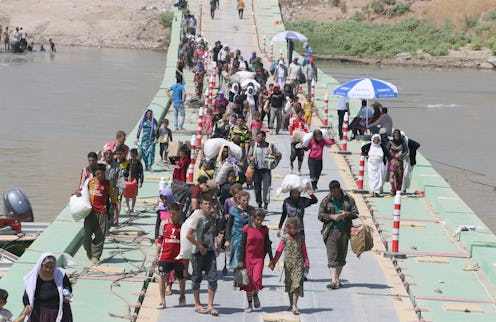News
ISIS Releases 250 Religious Minority Prisoners
After six brutal months in captivity, more than 200 Yazidis have been freed from the grips of ISIS likely because the terrorist organization deemed them "too expensive to feed," a Kurdish general said. The small religious minority, which once called northern Iraq its home, was driven out of the area and into ISIS control after the group attacked the region in 2014. Many Yazidis were trapped in the Sinjar Mountains after ISIS attacks left men dead and women enslaved. According to sources familiar with the situation, almost all of the individuals freed were in poor health, and most of them were elderly, although young children were also included in the group. Khodr Domli, a Yazidi rights activist, told the AFP, "Some are wounded, some have disabilities, and many are suffering from mental and psychological problems."
The Yazidis have suffered a long history of persecution and discrimination after developing a reputation as "devil worshipers" in the highly volatile, war-torn Middle East. Viewed as apostates by ISIS, the newly released members of the Yazidi described their experience as torturous and said that they were "humiliated" by the militant group. Gawre Semo, a 69-year-old who was one of the Yazidi returned to freedom, told the Associated Press, "They are very bad people. They took our children and they took the women. They did bad things with us."
ISIS did not provide a reason for releasing the individuals and simply deposited them near the city of Kirkuk, where they were received by the Kurdish Peshmerga, the fighting force of Iraqi Kurdistan. From there, they will be transferred by bus to a refugee camp for the displaced in Dohuk. Hersh Hussiein, a government representative from a local municipality, told the AP:
We don't know the exact details of why they were released. But we have to welcome them and provide all their basic needs including medical treatment.
Several of the former prisoners are in dire need of medical attention, including Aryan Baker Mourad and Mourad Baker Mourad, two children who were released as part of the larger group. Their mother, Maha Faris Qassem, told news agencies that the boys had been badly bitten by mosquitoes, and were covered from head to toe in welts that had become infected without proper care. According to Qassem, had the boys remained in the hands of their captors, they would have surely perished, as their living conditions were far too squalid to be sustainable for the infirm and the elderly.
Saman Barzanji, director general of the local health department, told Al Jazeera:
We have dispatched laboratory teams to check their blood, to control for things such as polio and possible contagious diseases. Another team is here to handle the people's immediate health needs. We have also deployed ambulance teams to dispatch emergency cases to hospital.
Those released are now making supplications to the Iraqi and Kurdish governments to deploy all possible forces in order to free the remaining members of the Yazidi religious group who remain in captivity, a number that might reach the tens of thousands. Around 50,000 members of the tribe fled when ISIS first made its appearance in August, and many of them remain unaccounted for.
Initial assessments of the released prisoners found that they had suffered severe psychological damage — one of the older men released told the AFP that he thought he was going to be executed when ISIS led him and about 250 others away from the rest of the prisoners, only to find that he was being let go. Another man told the news agency that he spent the last six months in constant fear for his life and the lives of his loved ones, while another said, "It was so hard, not only because of the lack of food but also because I spent so much time worrying."
Because the militants and their prisoners have been on the move since August, it is likely that ISIS ultimately decided to free a few hundred of their captives because they were slowing the group down. Kurdish authorities are now questioning the released individuals to attempt to garner more information about the whereabouts of ISIS and the remaining prisoners.
Despite humanitarian aid drops from the United States and assistance from eight other countries that have collectively tried to address the growing crisis in northern Iraq, the situation remains dire. The coalition of nine nations has carried out more than 1,000 airstrikes in total against the Islamic State, but little progress appears to have been made. ISIS now controls a third of both Iraq and Syria, and appears to be gaining strength, particularly given their effectiveness at recruiting, both at home and abroad in Western nations.
Kurdish forces will continue to launch attacks against the terrorist organization, and the region remains a key place of refuge for those who have been released or have managed to escape ISIS.
Images: Getty Images (4)
